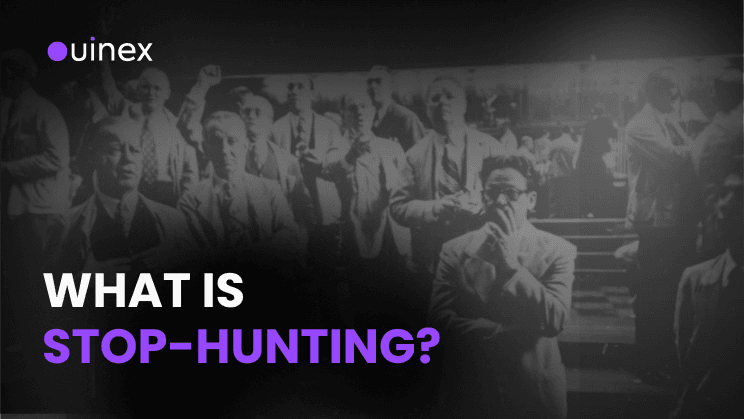
Stop Hunting: How Big Traders Trigger Your Losses
Ever placed a stop-loss order only to see the market dip, take you out, and then immediately reverse in the direction you originally predicted? That’s not just bad luck that’s (usually) stop hunting carried out by big financial institutions. And if you’re trading on a traditional crypto exchange using a CLOB execution model, you’re the perfect target.
Let’s break it down.
What Is Stop Hunting?
Stop hunting is a market manipulation tactic where large traders typically institutions or market makers intentionally push the price of an asset to trigger stop-loss orders. This forces retail traders (like you) out of their positions, causing a price drop that the big players can then capitalize on before the market bounces back.
In other words, the big players (institutional traders) have a look in the order book to see where a lot of traders have put their stop loss orders. Then they push the market in that direction (let’s say, they sell off some of their assets so the market dips). Once the stop loss orders are triggered, the price dips further, and the big player swoops in to buy at a discount. As the market was, and still is, generally going up, the price bounces back right away, and they’ve made a profit. But what about all the traders who had their stop loss orders triggered? Well, they no longer hold the asset.
It’s a classic move in crypto trading, where those with deep pockets take advantage of retail traders' predictable behaviors. Why does it only happen in crypto? Because it’s banned on most TradFi exchanges and punishment can be severe. Crypto exchanges are still very much unregulated.
Here’s how it works:
- Big players identify clusters of stop-loss orders.
- Most retail traders place their stop losses at obvious levels just below support in an uptrend or above resistance in a downtrend. Institutions can see these levels on order books.
- They push the price to trigger those stops.
- A coordinated sell-off (or buy-up) moves the price to that level, triggering stop losses en masse.
- The cascade effect kicks in.
- Stop losses trigger market sell (or buy) orders, causing price slippage and an exaggerated move.
- The big players scoop up discounted (or marked-up) assets.
- Once the stops are wiped out, the market naturally bounces back, and institutions ride the move in the original direction without retail traders in the way.
Why Does Stop Hunting Happen on CLOB-Based Crypto Exchanges?
Most crypto exchanges use a Central Limit Order Book (CLOB) model, which in theory is fair and transparent. But here’s the catch: transparency isn’t always a good thing.
Because the order book is visible to all traders, market makers and institutions can see exactly where stop-loss orders are stacked. That gives them a roadmap to your liquidation point.
Here’s why retail traders get wrecked:
- Institutions move faster. They use high-frequency trading (HFT) algorithms that execute orders in milliseconds, while retail traders execute manually or with basic bots.
- They control liquidity. Since institutions are the main liquidity providers, they have the volume to manipulate price just enough to trigger stops.
- Lack of regulation. Unlike traditional finance, where blatant stop hunting could trigger an investigation, crypto markets are largely unregulated, allowing institutions to exploit these tactics freely.
Ouinex: No More Stop Hunting
At Ouinex, we built a no-CLOB execution model specifically to stop these predatory tactics. Unlike traditional crypto exchanges, our model separates retail traders from institutional traders, so big players can’t see or manipulate your stop-loss levels.
- Institutions can only make prices, not take them. That means they provide liquidity but can’t execute against retail orders.
- The order book isn’t visible to them. No roadmap to hunt your stops.
- You control slippage. Ouinex lets you set max slippage limits, so you don’t get wiped out by artificial price swings.
Stop hunting is a rigged game designed to shake out retail traders. But when the rules change, so do the winners. Ready to trade where you’re not the prey?